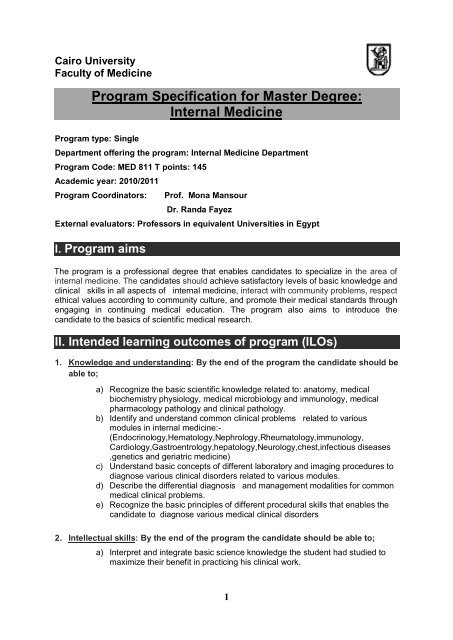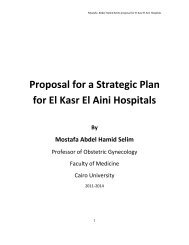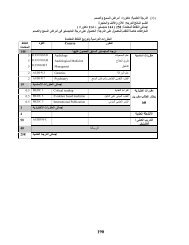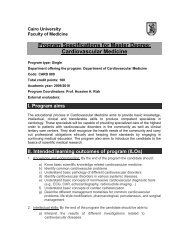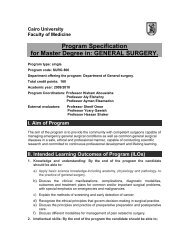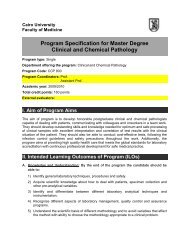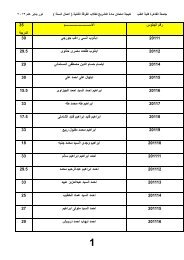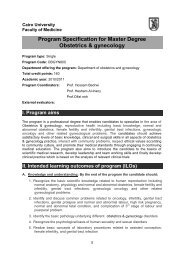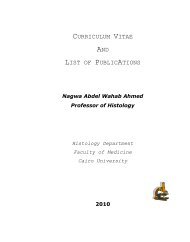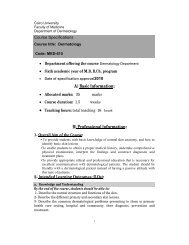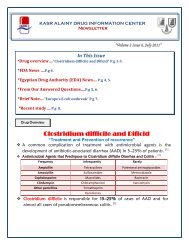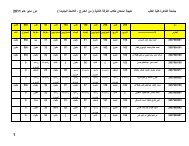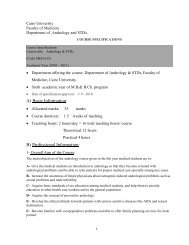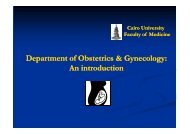Program Specification for Master Degree: Internal Medicine
Program Specification for Master Degree: Internal Medicine
Program Specification for Master Degree: Internal Medicine
Create successful ePaper yourself
Turn your PDF publications into a flip-book with our unique Google optimized e-Paper software.
Cairo University<br />
Faculty of <strong>Medicine</strong><br />
<strong>Program</strong> <strong>Specification</strong> <strong>for</strong> <strong>Master</strong> <strong>Degree</strong>:<br />
<strong>Internal</strong> <strong>Medicine</strong><br />
<strong>Program</strong> type: Single<br />
Department offering the program: <strong>Internal</strong> <strong>Medicine</strong> Department<br />
<strong>Program</strong> Code: MED 811 T points: 145<br />
Academic year: 2010/2011<br />
<strong>Program</strong> Coordinators:<br />
Prof. Mona Mansour<br />
Dr. Randa Fayez<br />
External evaluators: Professors in equivalent Universities in Egypt<br />
I. <strong>Program</strong> aims<br />
The program is a professional degree that enables candidates to specialize in the area of<br />
internal medicine. The candidates should achieve satisfactory levels of basic knowledge and<br />
clinical skills in all aspects of internal medicine, interact with community problems, respect<br />
ethical values according to community culture, and promote their medical standards through<br />
engaging in continuing medical education. The program also aims to introduce the<br />
candidate to the basics of scientific medical research.<br />
II. Intended learning outcomes of program (ILOs)<br />
1. Knowledge and understanding: By the end of the program the candidate should be<br />
able to;<br />
a) Recognize the basic scientific knowledge related to: anatomy, medical<br />
biochemistry physiology, medical microbiology and immunology, medical<br />
pharmacology pathology and clinical pathology.<br />
b) Identify and understand common clinical problems related to various<br />
modules in internal medicine:-<br />
(Endocrinology,Hematology,Nephrology,Rheumatology,immunology,<br />
Cardiology,Gastroentrology,hepatology,Neurology,chest,infectious diseases<br />
,genetics and geriatric medicine)<br />
c) Understand basic concepts of different laboratory and imaging procedures to<br />
diagnose various clinical disorders related to various modules.<br />
d) Describe the differential diagnosis and management modalities <strong>for</strong> common<br />
medical clinical problems.<br />
e) Recognize the basic principles of different procedural skills that enables the<br />
candidate to diagnose various medical clinical disorders<br />
2. Intellectual skills: By the end of the program the candidate should be able to;<br />
a) Interpret and integrate basic science knowledge the student had studied to<br />
maximize their benefit in practicing his clinical work.<br />
1
) Analyze symptoms and signs <strong>for</strong> every case to construct a differential<br />
diagnosis <strong>for</strong> the common clinical presentations.<br />
c) Design an appropriate diagnostic plan <strong>for</strong> evaluation of common clinical<br />
complaints taking into consideration the nature of the clinical situation and the<br />
risks, benefits and costs to the patient.<br />
d) Interpret the results of different investigations guided by the history and<br />
examination.<br />
e) e)Set up treatment plans <strong>for</strong> common clinical problems taking into account the<br />
cultural and individual needs.<br />
3- Professional and practical skills: By the end of the program the candidates should<br />
be able to;<br />
a) Practice the art of history taking.<br />
b) Identify symptoms and signs of common clinical disorders.<br />
c) Suspect the rare clinical disorders based on clinical and laboratory data.<br />
d) Per<strong>for</strong>m simple bed side clinical procedures.<br />
e) Offer an accurate medical diagnosis after the interpretation of investigations.<br />
f) Offer proper medical treatment <strong>for</strong> various medical problems .<br />
g) Manage medical emergencies properly.<br />
4- General and transferable skills: By the end of the program the candidates<br />
should be able to;<br />
a) Communicate with the patients in an ethical way to gain their confidence.<br />
b) Respond effectively to a patient’s emotional and psychosocial concerns<br />
c) Communicate with other health care providers<br />
d) Respect the item of patient referral to another specialty at proper time.<br />
e) Appreciate team working.<br />
f) Achieve Computer skills necessary to make use of medical data bases and<br />
use the internet <strong>for</strong> communication.<br />
g) Show administrative skills that enables him to fulfill the paper work needed<br />
h) Show leadership skills that enable him to organize work and lead the junior<br />
and paramedical staff.<br />
i) Understand different scientific methodologies and have critical reading<br />
abilities<br />
j) Write scientific article according to the basics of scientific research.<br />
III. Academic standards.<br />
External references <strong>for</strong> standards:<br />
Royal College of physicians in UK<br />
IV. <strong>Program</strong> admission requirements.<br />
According the Faculty of <strong>Medicine</strong>, Cairo University Bylaws <strong>for</strong> Post Graduate <strong>Program</strong>s<br />
(July 2009), applicants should have MBBCh or equivalent degree. According to Cairo<br />
University requirements, all applicants <strong>for</strong> postgraduate studies should fulfill preliminary<br />
courses on the following subjects; Medical statistics I – English language (Toefl or equivalent<br />
degree) – Computer skills (ICDL) or equivalent computer course offered by the medical<br />
education center (MEDC). Admission to the program is open during July.<br />
2
V. <strong>Program</strong> structure and contents.<br />
<strong>Program</strong> duration: Three years.<br />
<strong>Program</strong> structure: Total Credit points 145<br />
· First part: 1.5 years - Total credit points 55 - (Table 1)<br />
o Compulsory courses; one academic year (30 weeks)<br />
• Basic sciences courses<br />
9 credit points<br />
Anatomy,<br />
1 credit point<br />
Medical Biochemistry, 1.5<br />
Medical physiology, 1.5<br />
Medical Microbiology and Immunology, 1.5<br />
Medical Pharmacology, 1.5<br />
Pathology, 1.5<br />
Clinical Pathology 0.5<br />
o Elective courses<br />
1 credit points<br />
o Scientific activities<br />
o Residency training program ( Basic training ):<br />
(one year)<br />
· Second part: 1.5 years - Total credit points 70 - (Table 2)<br />
1 credit points<br />
44 credit points<br />
o Compulsory courses; one academic year (30 weeks)12 credit points<br />
Endocrinology,<br />
Hematology,<br />
Nephrology,<br />
Rheumatology,<br />
Immunology<br />
Cardiology,<br />
Gastroentrology,<br />
hepatology<br />
Neurology,<br />
chest,<br />
Infectiousdisease,<br />
Genetics<br />
Geriatricmedicine<br />
o Scientific activities 3 credit points<br />
o Residency training program (specialized training ):<br />
Two years 55 credit points<br />
· <strong>Master</strong> Thesis: completed during second part 20 credit points.<br />
3
Table 1: First part<br />
Courses<br />
Credit<br />
points<br />
code<br />
ILOs<br />
Compulsory courses (One academic year)<br />
· Anatomy<br />
1<br />
MED<br />
801<br />
1-a<br />
2-a<br />
· Medical<br />
Biochemistry<br />
1.5 MED<br />
803<br />
1-a,<br />
2-a<br />
· Medical<br />
Physiology<br />
· Medical<br />
Microbiology<br />
and<br />
Immunology<br />
· Medical<br />
Pharmacology<br />
1.5 MED<br />
804<br />
1.5 MED<br />
806<br />
1.5 MED<br />
807<br />
1-a<br />
2-a<br />
1-a<br />
2-a<br />
1-a<br />
2-a<br />
· Medical<br />
pathology<br />
1.5 MED<br />
808<br />
· Clinical and 0.5 MED<br />
Chemical<br />
822<br />
pathology<br />
Total 9<br />
Elective Courses (MEDC) choose 2 courses<br />
o Critical Reading<br />
0.5<br />
MEDC 1<br />
1-a<br />
2-a<br />
1-a<br />
2-a<br />
o Scientific writing<br />
0.5<br />
MEDC 2<br />
4-,e,f,h,i<br />
o Evidence based medicine<br />
0.5<br />
MEDC 3<br />
o Medical statistics II<br />
0.5<br />
MEDC 4<br />
o Medical ethics<br />
0.5<br />
MEDC 5<br />
o Communication skills<br />
0.5<br />
MEDC 6<br />
Total 1<br />
Scientific activities<br />
1<br />
Residency training program<br />
44<br />
Total first part 55<br />
MED C1<br />
4-g,i<br />
2-b,c,d,e<br />
3-<br />
a,b,c,d,e,f,g<br />
4-<br />
a,b,c,d,f,g.h<br />
,I,j<br />
4
Table 2: Second part<br />
Item<br />
<strong>Internal</strong> <strong>Medicine</strong> modules<br />
Endocrinology,Nephrology,Hematology,<br />
Rheumatology,Gastroentrology,hepatology,<br />
Cardiology,Neurology,chest,infectious Ds.<br />
Credit<br />
points<br />
Scientific activities 3<br />
<strong>Master</strong> thesis 20<br />
Residency training clinical program 55<br />
Total second part 70<br />
12<br />
Code<br />
MED 811 T<br />
MED 811 C2<br />
ILOs.<br />
1-b<br />
2-,b,c,d<br />
3-a,b,c,d<br />
4-a,b,c,d.<br />
4-g,i<br />
4-,i.j<br />
2-,b,c,d,e<br />
3-a,b,c,d,e,f,g<br />
4-<br />
a,b,c,d,e,f,g,h,I,j<br />
Residency Training <strong>Program</strong><br />
· First phase (Basic Training):<br />
According the Faculty of <strong>Medicine</strong>, Cairo University Bylaws <strong>for</strong> Post Graduate <strong>Program</strong>s<br />
(July 2009) All the students (trainees) should have a basic training <strong>for</strong> 1 year. They<br />
should spend 9 months in an internal medicine department and 3 months in medical<br />
emergency department. The student is expected to attend the outpatient clinics, inpatient<br />
section, the casualty on call and the medical ICU under the supervision of senior staff<br />
During this period the students attend the basic sciences courses. They should also<br />
complete the elective courses<br />
· Second phase (Special Training):<br />
All students should complete the special part of the residency-training program in the<br />
internal medicine department. They should spend 24 months in order to complete the<br />
needed credit points. . During this period the students will prepare his thesis and<br />
participate in the scientific activities of the department.<br />
NB: The details of the training program will be provided in separate document. The third<br />
phase of residency training (advanced training) is part of the MD degree has a duration<br />
of 24 months.<br />
<strong>Master</strong> Thesis<br />
All master-degree students should prepare a thesis in one of the modules of <strong>Internal</strong><br />
<strong>Medicine</strong>.<br />
The department and the ethical committees must approve the protocol of the research. The<br />
thesis should include a review part and a research part. The Thesis is supervised by one or<br />
more senior staff members (a maximum of 3 staff) from the <strong>Internal</strong> <strong>Medicine</strong> department<br />
and may include other specialties according to the nature of the research. The thesis should<br />
be evaluated and approved by a committee of three professors including one of the<br />
supervisors and an external professor. Approving the thesis is mandatory to allow the<br />
student to set <strong>for</strong> the second part exam.<br />
5
Scientific Activities:<br />
The students should participate in the scientific activities of his unit and department such as:<br />
· Journal club.<br />
· Seminars (including recent topics and controversial issues). Students are expected<br />
to participate in the discussions.<br />
· Scientific meetings arranged by the department( weekly departmental round –<br />
grand round-monthly ;and the joint meeting with the general surgery<br />
department)<br />
Each activity is monitored and given credit points registered in a special section in the<br />
residency-training logbook. The student should collect the required points be<strong>for</strong>e allowed to<br />
sit <strong>for</strong> the exam.<br />
V. Regulations <strong>for</strong> progression and program completion<br />
After collecting the required credit points <strong>for</strong> the respective courses, the first phase of the<br />
residency training, and the scientific activities, the student will be eligible to sit <strong>for</strong> the first<br />
part examination. In case the student fails to pass the examination, he/she may proceed in<br />
the clinical training and can resubmit <strong>for</strong> the next examination. After passing the first part, the<br />
student submits a protocol <strong>for</strong> <strong>Master</strong> Thesis at the beginning of the second part. Be<strong>for</strong>e<br />
submitting to the final examination he/she should finish the thesis and get approval,<br />
complete phase 2 of special training program, and collect the required credit points. The<br />
candidate will receive his/her degree after passing this final examination. <strong>Master</strong> degree<br />
should be obtained within a maximum of 6 years after registration date. It is legible <strong>for</strong> the<br />
candidate who had his master degree to register in one of the specialized master degrees<br />
related to internal medicine (Endocrinology,Heamatology,Gastroentrology,Nephrology)<br />
VI. Assessment<br />
A: Assessment Tools:<br />
· Supervision & Monitoring :<br />
According to the Faculty of <strong>Medicine</strong>, Cairo University Bylaws <strong>for</strong> Residency Training<br />
<strong>Program</strong>s and master degree programs, coordinators carry continuous assessment during<br />
the program. A residency training logbook will be kept <strong>for</strong> each student to document all his<br />
clinical and procedural skills, his participation in different scientific activities,and the lectures<br />
he is obliged to attend with a minimum of 75%. The head of the department should allow the<br />
students to undergo the final examination when they collect the credit points needed from<br />
the training program and show satisfactory attendance <strong>for</strong> the master degree lectures.<br />
· Formal Assessment<br />
According the Faculty of <strong>Medicine</strong>, Cairo University Bylaws <strong>for</strong> Post Graduate <strong>Program</strong>s<br />
(July 2009), Students should be assessed at the end of first part and at the end of the<br />
second part<br />
1. First Part Final Exam:<br />
· Physiology and Medical Biochemistry: Three-hour written exam ,two papers<br />
(including short assay and multiple choice questions) + oral exam<br />
· Medical pharmacology and Medical Microbiology and Immunology: Three-hour<br />
written exam, two papers (including short assay and multiple choice questions) + oral<br />
exam<br />
· Pathology and Clinical pathology: one and half-hour written exam, two papers<br />
(including short assay and multiple choice questions) + oral exam<br />
6
· Anatomy: one and half-hour written exam (including short assay and multiple choice<br />
questions) + oral exam<br />
2. Second Part Final Exam Part 2:<br />
· <strong>Internal</strong> <strong>Medicine</strong>: Two written exams (Three-hours each) including short<br />
assay questions, and MCQ (including problem solving)+ oral exam + clinical<br />
exam+ practical stations (ECG , X-ray )<br />
B: Assessment Schedule:<br />
1. First Part Final Exam:<br />
The written exam will be held in April/October (four days):<br />
Day one: physiology-medical biochemistry (3 hours)<br />
Day two: medical pharmacology-medical microbiology and immunology<br />
(3 hours)<br />
Day three: pathology-clinical pathology (1.5 hours)<br />
Day four: anatomy (1.5 hours)<br />
This will be followed by the clinical and oral exams in separate days<br />
2. Second Part Final Exam:<br />
The written exam will be held in May/ November (two days):<br />
Each day a written exam <strong>for</strong> (3 hours)<br />
This will be followed by the clinical and oral exams in separate days<br />
C: Wheighting Of Assessment: Marks allocated to courses<br />
7
Course Written Oral Clinical/diagnostic<br />
tools<br />
First part 450<br />
Anatomy 25 25 50<br />
Physiology<br />
Medical<br />
biochemistry<br />
Pharmacology<br />
50 25<br />
50 25<br />
50 25<br />
Microbiology 50 25<br />
Pathology 25 25<br />
Clinical<br />
pathology<br />
Total<br />
150<br />
150<br />
25 25 100<br />
Second part 600<br />
<strong>Internal</strong><br />
<strong>Medicine</strong><br />
o Paper 1 150<br />
o Paper 2 150<br />
100 150 (clinical)<br />
50 (diagnostic<br />
tools)<br />
600<br />
Remarks<br />
· It is mandatory to pass the two papers of the internal medicine exam separately<br />
· Passing mark in a written exam is ≥ 60%<br />
8
VII. Evaluation of program intended learning outcomes:<br />
Evaluator Tool Sample<br />
1. Senior Students Questionnaire at the end of the<br />
program<br />
2. Alumni The faculty is currently developing<br />
an Alumni office <strong>for</strong> postgraduates<br />
3. Stakeholders A meeting will be arranged during<br />
the annual conference of the<br />
department<br />
4. External Evaluators Review the program and courses<br />
Attending the final exam.<br />
All the PG<br />
students<br />
Not yet determined<br />
Available<br />
representatives<br />
from:<br />
· Army hospitals<br />
· National medical<br />
insurance<br />
· Medical syndicate<br />
· Ministry of health<br />
Once be<strong>for</strong>e<br />
implementation<br />
Bi-annual report<br />
5. College Quality<br />
Assurance committee<br />
Annual program review<br />
Date of approval by department council<br />
<strong>Program</strong> Coordinators<br />
Prof Mona Mansour<br />
Dr Randa Fayez<br />
Head of Department<br />
Prof Mohamed Salem<br />
9


